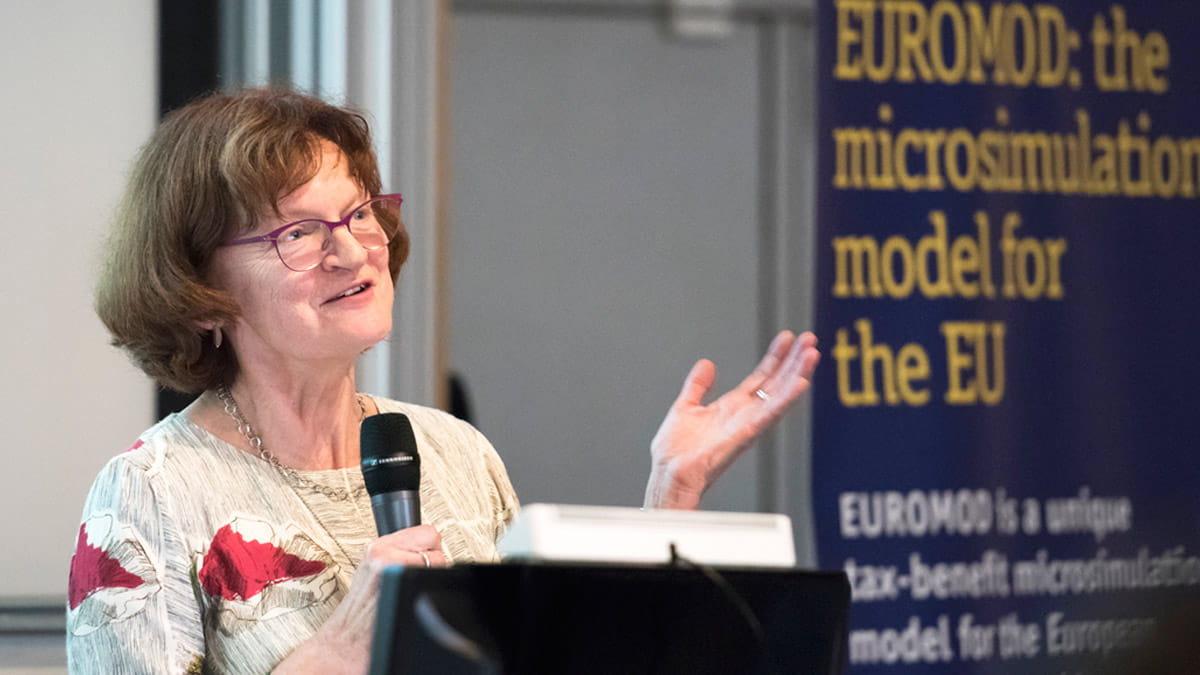Impact: The tool to predict policy impact that went global
We help policymakers and governments test their economic policies before putting them in place
-
Tagged under
Economy, business, politics and society
Global perspectives and challenges
-
Lead Academic
Professor Holly Sutherland

Imagine you had a tool which allowed you to see the impact of your polices before you put them into place or let you test the effectiveness of existing ones.
That is what EUROMOD allows you to do by providing a ‘tax-benefit microsimulation model’ which gives researchers the ability to test the consequences of policy choices on households - providing vital insights to policymakers and governments.
Across the European Union’s 28 states it has been used to develop policy and model the impact of economic and social decisions.
Now as EUROMOD enters its third decade the rest of the world beyond Europe is increasingly recognising the importance and potential of the tool.
Developed by Professor Holly Sutherland, who now leads a team of researchers at the Institute for Social and Economic Research at Essex, in collaboration with experts from across the European Union it has become incredibly influential.
Praise from European Commission
As it celebrated its 20th anniversary last year European Commissioner for Employment, Social Affairs, Skills and Labour Mobility Marianne Thyssen said in a special video message: “The importance of this project grows with every year and is highly valued by the European Commission.
“We are proud to have supported this analytical tool which has contributed to efficient policy making at national and European level.
“That means policies based on evidence with a thorough understanding of economic and social impacts.”
Testing policy impact across Europe

EUROMOD is used across a huge range of policy fields and is integrated into the European Union’s economic policy coordination process. It has also been used to assess the social impact of stability support for Greece and has improved insights into poverty risks in the European Union.
Results may be evaluated for individual countries on their own or in comparison with each other, for the EU as a whole, or for any sub-group of countries. However, the model can also be used in any country with relevant microdata.
"Microsimulation will be one of the main tools we use to understand how to assess options to reduce child poverty by 50% by 2030 in order to achieve one of the Sustainable Development Goals"
EUROMOD is used by the European Commission’s Directorate-General for Employment, Social Affairs and Inclusion (DG-EMPL) in policy formulation and analysis, demonstrated in a number of policy reports, including Employment and social developments in Europe and The EU Employment and Social Situation Quarterly Review.
The Austrian government has used a version of EUROMOD to both help the country meet poverty-reduction targets and to create a portal through which all Austrians can assess the potential impact of policy changes.
The Greek government has used EUROMOD to model the effects various austerity policies that have been either adopted or abandoned as a result. EUROMOD has also been adapted and used by the governments of South Africa and Serbia.
EUROMOD goes global
Members of the EUROMOD team at ISER have begun work with South African Social Policy Insights (SASPRI) on an ambitious project to build tax-benefit microsimulation models, based on the EUROMOD platform, for a selection of developing countries, funded by UNU-WIDER. These models are collectively known as SOUTHMOD.
Professor Holly Sutherland said: “The EUROMOD community is already global in outlook with the potential to extend the EUROMOD approach worldwide, both to countries in the developing world without such tools, and to non-EU OECD developed countries for comparative purposes.”
Africa is the main focus for the project and microsimulation models are being constructed for Ghana, Ethiopia, Zambia, Tanzania and Mozambique. These new models complement existing models for South Africa (SAMOD) and Namibia (NAMOD), which are also based on EUROMOD and have been put together by SASPRI.
The project team will see how the model might be adapted for other regions so a model has been built for one Latin American country, Ecuador, and initial scoping for one country in Asia, Vietnam, will be undertaken.
“Beyond an indispensable instrument for anyone concerned with income distribution, EUROMOD is a true network of excellence. EUROMOD is a beacon for European economic and social research” Michael Förster, Senior Social Policy Analyst, OECD
The future of EUROMOD
February 2017 marked the beginning of a process of transferring responsibility for the regular updating and maintenance of EUROMOD from the University of Essex to the European Commission.
This is a reflection of the Commission’s commitment to EUROMOD’s long term future and to the value it places on analysis using EUROMOD as part of the European Semester as well as for policy-relevant research in general.
It demonstrates what a success our project has been and is an indicator of the impact EUROMOD has had, as well as securing its position to continue to do so for many years to come.
Research Team
The rest of the team
- Meet the rest of the EUROMOD development team

